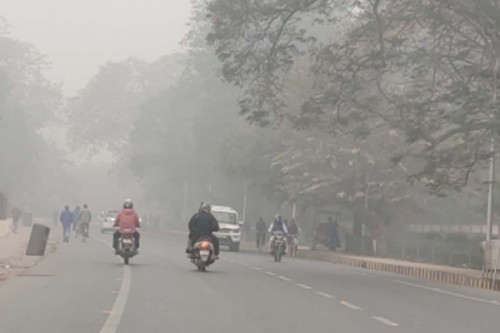With Diwali, Chhath round the corner, Bihar braces for dip in air quality

Patna, Oct 23 (IANS) The people of Bihar need to wear face masks not only due to Covid-19 but also because of the high air pollution especially in the urban areas of the state.
The air quality index in major cities like Darbhanga, Motihari, Patna, Bettiah, Muzaffarpur is poor to very poor and is heading towards dangerous levels.
"Unlike the national capital and the NCR cities where the use of crackers is banned, crackers are not banned in Bihar. As a result, the air quality may deteriorate more due to smoke from the bursting of crackers and it mixes with fine particles of PM 2.5 and PM 10," said officials.
"We believe that the formation of smog would take place once the temperature dips more. It has become hazardous for human health as the majority of the cities in Bihar are having humid conditions," said an official of the Bihar State Pollution Control Board (BSPCB).
The BSPCB chairman Ashok Ghosh said: "During the lockdown due to Covid 19, the AQI of all cities improved. Now, it is deteriorating more especially during the season of Diwali."
As per the real-time Air Quality Index (AQI) dashboard, North Bihar's Darbhanga city is on the top with 243 which is considered as most unhealthy. Besides, the PM 2.5 level was also at 94 per cubic meter. East Champaran's Motihari district had 204, Saharsa 196, Chapra 194, Patna 190, Bhagalpur 185, Araria 184, Khagaul (Danapur) 184, Bettiah 183 and Muzaffarpur 178.
The situation in these cities has remained the same for more than one week and it will worsen till Chhath Puja.
The official said that this is morning hours data when vehicles are not plying on the roads in large numbers. The AQI in these cities will increase as the day progresses. It will deteriorate further in the evening.
As per the parameters of the Council of Scientific and Industrial Research, the AQI is generally calculated through the presence of Carbon Monoxide (CO), Sulphur Dioxide (SO2), Nitrous Oxide (N2O) and Perticulater Meters (PM) of lead (PB), Arsenic (AS) and Nickel (NI).
AQI from 0 to 50 is considered good, from 51 to 100 it is considered moderate, from 101 to 150 as unhealthy for sensitive groups, from 151 to 200 as unhealthy for all groups, from 201 to 300 as very unhealthy and from 301 to 500 it is deemed hazardous for human health.
"The biggest worry for people in the urban areas is the rampant construction taking place. Alarmingly, the private developers are not following the guidelines of the National Green Tribunal to cover the portion of the building where the construction is taking place," said Rajendra Sharma, a resident of Patna's suburban locality Khagaul (Danapur).
"The law enforcement agencies have given a free hand to private developers leading to air chaos in the region. Moreover, the trucks and tractors which are used to carry construction material like sand and cement do not follow any norms. They transport construction material without any cover," Sharma said.
Another resident, Sharmila Thakur of Digha locality, said: "Patna is an old city which was not developed according to a master plan. The roads here are two-laned in the majority of the places."
"The civic agencies used to remove solid waste from the drains before the monsoon season and put it on the roads. There is no method for the proper disposal of the waste. As a result, the dust is flying in the air and further polluting the atmosphere.
"The Diwali pollution is temporary which lasts for a week but the menace on the roads is turning out to be non ending for the residents of Patna especially those residing in densely populated areas.
"A high density of population generally triggers the maximum use of private vehicles. In the majority of the cities of Bihar including Patna, public transport like metro is not available for residents. Even the electric or CNG buses are not available at regular intervals.
"People therefore either use private vehicles or diesel-run three wheelers which generate more toxic gases. The CNG run autos are available only when you book them for personal travel. They are not available for sharing," said Ashok Bhan, a resident of Rajbanshi Nagar, Patna.
Dr Shalini Verma, a Patna based gynaecologist said: "From respiratory issues to cognitive decline, poor air quality has adverse health effects. Sometimes, it can lead to the death of asthmatic patients."
"Many medical researchers have suggested that air pollution is particularly harmful for unborn babies during pregnancy. It has a negative effect on both the mother and the foetus if the air quality is below standard."

|

|

